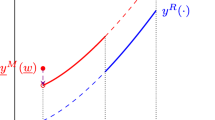Abstract
We consider the problem of allocating a finite set of indivisible goods and a single infinitely divisible good among a group of agents, and we study a solution, called the Identical Preferences Lower Bound solution, in the presence of consistency properties. This solution is not consistent. We prove that its maximal consistent subsolution is the No-envy solution. Our main result is that the minimal consistent extension of the intersection of the Identical Preferences Lower Bound solution with the Pareto solution is the Pareto solution. This result remains true in the restricted domain when all the indivisible goods are identical, but not when there is a unique indivisible good.
Similar content being viewed by others
References
Alkan A, Demange G, Gale D (1991) Fair allocation of indivisible goods and criteria of justice. Econometrica 59: 1023–1039
Aragones E (1992) A solution to the envy-free selection problem in economies with indivisible goods. Mimeo, Northwestern University
Aumann R, Maschler M (1985) Game theoretic analysis of a bankruptcy problem from the talmud. J Econ Theory 36: 195–213
Dubins L, Spanier E (1961) How to cut a cake fairly. Amer Math Monthly 68 no 1, 17
Hart S, Mas-Colell A (1989) Potential, value, and consistency. Econometrica 57: 589–614
Lensberg T (1987) Stability and collective rationality. Econometrica 55: 935–961
Maskin E (1987) On the fair allocation of indivisible goods. Chapter 11 in Arrow and the Foundations of the Theory of Economic Policy, G. Feiwel eds., London, Macmillan, 341–349
Moulin H (1985) The separability axiom and equal sharing methods. J Econ Theory 36: 120–148
Moulin H (1990) Fair division under joint ownership: recent results and open problems. Soc Choice Welfare 7: 149–170
Peleg B (1985) An axiomatization of the core of cooperative games without side-payments. J Math Econ 14: 203–214
Sasaki H, Toda M (1992) Consistency and characterization of the core of two-sided matching problems. J Econ Theory 56: 218–227
Steinhaus H (1948) The problem of fair division. Econometrica 16: 101–104
Svensson LG (1983) Large indivisibilities: an analysis with respect to price equilibrium and fairness. Econometrica 51: 939–954
Tadenuma K, Thomson W (1991) No-envy and consistency in economies with indivisible goods. Econometrica 59: 1755–1767
Tadenuma K, Thomson W (1993) The fair allocation of an indivisible good when monetary compensations are possible. Math Soc Sciences 5: 117–131
Thomson W (1988) A study of choice correspondences in economies with a variable number of agents. J Econ Theory 46: 237–254
Thomson W (1990) The consistency principle. Game Theory and Applications, Ichiishi T, Neyman A, Tauman Y, eds., Academic Press, New York, 187–215
Thomson W (1992) Consistent extensions. Math. Soc Sciences 28: 35–49
Author information
Authors and Affiliations
Additional information
This paper was developed during my stay at Rochester University in the summer of 1992. I would like to express my special thanks to Professor William Thomson for all his help and advice. Iam also grateful to my supervisor Luis Corchón, to Koichi Tadenuma and to the anonymous referees for their helpful comments. The remaining errors are my exclusive responsibility. Financial support from the DGCYT under project PB 91-0756 and the Instituto Valenciano de Investigaciones Económicas are gratefully acknowledged.
Rights and permissions
About this article
Cite this article
Bevia, C. Identical preferences lower bound solution and consistency in economies with indivisible goods. Soc Choice Welfare 13, 113–126 (1996). https://doi.org/10.1007/BF00179102
Received:
Accepted:
Issue Date:
DOI: https://doi.org/10.1007/BF00179102




